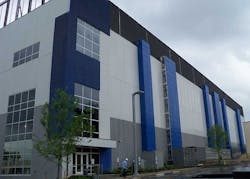Leading data center providers are building again in Northern New Jersey, which is seeing steadily improving demand from enterprise customers seeking space.
Digital Realty, the largest developer of wholesale data space, recently began construction on a 150,000 square foot built-to-suit data center for the anchor tenant on its campus in Totowa. This will be the first of two data center buildings planned for the site, with the second phase planned for 250,000 square feet.
“We will be developing a highly strategic, purpose-built, new infrastructure solution to help a leading data analytics provider optimize data exchange for their employees, customers and partners,” said William Stein, the CEO of Digital Realty, during the company’s recent earnings call.
“In terms of specific wins during the quarter, the New York metro area was a standout,” added Stein, who said it was “the top destination for network and enterprise-oriented deployments during the second quarter.”
The Return of the Built-to-Suit Project
The Digital Realty build-to-suit project is notable because this type of development hasn’t been seen recently in New Jersey, which was once the premier market for single-tenant data centers for the financial industry. The Totowa project builds on several years of positive momentum for multi-tenant data centers in the Garden State, with both colocation and wholesale suites seeing improved demand.
New Jersey was once a hotbed of data center activity, with thriving markets for colocation and financial data centers. The state maintains a substantial and strategically important data center community, but the hottest leasing action has shifted elsewhere. New Jersey has largely missed the cloud computing boom, as large deals have sought states where it is cheaper to do business. Northern Virginia had a record 270 megawatts of leasing in 2018, or more than 20 times the volume of New Jersey’s leasing.
The New Jersey data center market is home to about 2.1 million square feet of data center space, according to research from datacenterHawk. With a vacancy rate as high as 15 percent in recent years, New Jersey has more unfilled space than many leading data center markets, reflecting lower demand.
That’s begun to change in 2019 and into 2020, as multi-tenant providers have reported a modest pickup that has begun to absorb vacant space, creating a healthier balance between supply and demand.
A History of Single-Tenant Facilities
New Jersey was a strong early player in the build-to-suit market, as seen in the success of companies like Russo Development. Between 1999 and 2010. Russo built at least eight custom data center projects spanning 1.7 million square feet, including single-tenant facilities for NYSE Euronext, Credit Suisse, JP Morgan Chase, Cervalis Managed Hosting and SunGard Availability Services.
These data centers provided scale and security for the specialized needs of financial tenants. Build-to-suit projects in New Jersey gained momentum after the 9-11 terror attacks, as financial regulators cracked down on key financial players that had both production and backup data centers within the five boroughs.
Things changed during the financial crisis of 2008-2009. As Wall Street retrenched and sought to conserve cash, owning and operating capital-intensive data centers became less attractive. That led to a surplus of space in 2011-12, from which the NJ market has been slowly recovering.
In recent years, Iron Mountain, CyrusOne and QTS Data Centers acquired facilities in New Jersey, and NJFX built a new data center focused on the subsea cable business. New Jersey’s rising profile as a cable landing destination is part of a larger shift in global data flows, driven by cloud computing and “data gravity” as more enterprises rely on data analytics and artificial intelligence.
New York:The Premier Digital Capital
The data-centric nature of business is shaping strategy at Digital Realty, which sees major global business centers emerging as “digital capitals” that will be focal points for data center services.
That’s why the company sees the new Totowa project – built for a leading analytics provider optimizing data exchange – as “highly strategic.” Cities like New York, Tokyo and London “are hubs for the highest density of digital commercial activity and digitally-skilled workforces … their focus on the creation of new digital technologies and applications makes them prime examples of what’s possible in the world’s data economy.”
In a Digital Capitals report released last year, Digital Realty identified New York as “the world’s data capital,” with the potential to see major annual growth of data generated by AI, IoT, blockchain and 5G wireless technologies.
That study was released prior to the COVID-19 pandemic, which is challenging long-held attitudes about the attractiveness of cities – including New York, the early epicenter of coronavirus cases in the U.S. But at least within the data center industry, there are signs that data will continue to reside in the Greater New York region.
In June, Sabey Data Centers is undertaking a major expansion of its New York City property, substantially boosting the data center space in the building. Sabey said this week that it will add 3.6 megawatts of capacity at its Intergate.Manhattan and has leased a portion of the new space to a financial services tenant.






